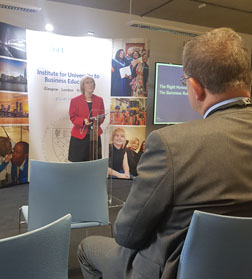The London campus of Glasgow Caledonian University was the setting for the launch last week of a pair of security-related courses hailed as exciting and ‘ground breaking’ by the former chair of the Security Industry Authority, and former university academic, Baroness Henig.
In a wide-ranging introduction to the morning’s launch at GCU’s building in Spitalfields, Ruth Henig praised the new courses as vocationally-based and bridging the gap between theory and practice. Their modules were written by Simon Roberts of training company CAMOR, and taken on by the university.
The two courses are a top-up BSc honours degree in applied integrated security operations; and an MBA, a senior leaders master’s degree apprenticeship, in applied professional practice (security operations). Each are subject to programme approval.
The BSc is work-based. In the education jargon, it’s ‘blended learning’, meaning that as with many postgraduate courses it’s largely done online, and you attend the actual uni occasionally – three times in a year, five days in each of three terms. If you take the course over two years, that’s two days for six terms. The basic part of the course covers ‘action-centred personal and professional development’, research methods for the workplace (in other words, how you might carry out a security analysis as applying to your job), and a work-based project. You choose two from five other modules, on ‘people security and insider risk’, crime prevention, aviation security management, safety and security in crowded places, and cyber security for businesses. The BSc is aimed at people already in security ops.
The security operations MBA meanwhile likewise can be based on what you do in your work. It teaches ‘responsible leadership’, people security and insider risk, cyber, ‘corporate citizenship in a global age’, resilience continuity and crises management, and a project. Again you largely do the course remotely, and attend the actual uni for 15 days. Students can work towards a professional membership of the Chartered Management Institute (CMI). For the MBA, you should have a first degree; while for the BSc you are asked to show that you can study at honours level.
In her talk, Baroness Henig, pictured, set out the challenges and problems of the private security industry – that while the Security Industry Authority (SIA, which she used to chair) has more than 400,000 licences live, and public spaces are increasingly guarded by private security officers – and the UK has an estimated ratio of four security officers to one police officer – only individuals and not security businesses are compulsorily regulated by the SIA. She spoke of the need for refresher training and upskilling of security staff, beyond the basic learning required to apply for the SIA badge.
Ruth Henig, a non-exec chairman of the Glasgow-based guarding contractor Securigroup, called on all to come together to help provide upskilling for the front-line security officer.
Also speaking at the launch from GCU were the Dean of GCU London, Prof Antony Morgan; Marty Wright, head of academic, Institute for University to Business Education; and Fiona Stewart-Knight, assistant vice principal, business and director, of the Institute.
More in the November 2019 print issue of Professional Security magazine.










